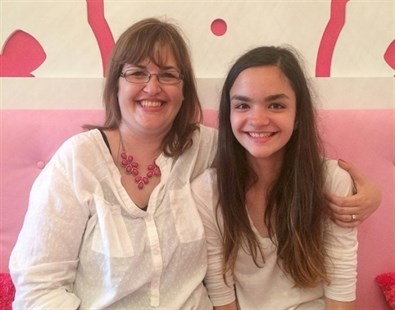
Kathy Sima and her daughter, Taylor, are seen in this undated handout photo. Sima's 13-year-old daughter is starting high school in September but already has previous experience staying home alone after school.
Image Credit: THE CANADIAN PRESS/HO-Kathy Sima
August 04, 2014 - 9:31 AM
Kathy Sima's daughter Taylor starts high school this fall, but the 13-year-old has already experienced another key rite of passage for many teens: staying home alone.
Initially, a neighbour's 16-year-old daughter would walk Taylor home and stay with her, which Sima said worked for a short period of time — until her child told her it wasn't necessary.
"When she said: 'OK, well, I'm not really sure why you're paying her to be here with me, she's not really doing anything. I could do this myself.' I started to realize, 'OK, she's ready for more responsibility,'" said Sima, co-editor of Tweenhood, an online magazine for parents of tweens.
"It seems like someting she's more comfortable with, so that was a good indication to me that it was time to try it, at least."
Many parents were likely once latchkey kids themselves, returning to an empty house while adults were at work, running errands or out at a social function. Still, the thought of having children home unsupervised — even for brief periods — can prove unnerving.
"There's certainly some discomfort initially with leaving their children alone," said Lewis Smith, communications and media program coordinator with the Canada Safety Council.
"But as long as the child is responsible, as long as they take care of what they're doing, and as long as they're properly educated on what to do and what not to do when they're home alone, there's no real need for concern."
The first step is assessing whether the child is mature enough to handle the responsibility.
"There is no legal age to leave your kids at home alone," said Samantha Wilson, president of Kidproof Safety. "The guideline is around 10 years old, but all kids mature at different rates. So, some kids who are 10 may be able to be at home alone for a couple of hours; however, some kids won't be ready until they're in their teens."
Wilson's organization offers the At Home Alone program which is recommended to kids aged 10 and up.
"Kids are usually excited to be left at home alone. They like that new responsibility, but they're also fearful," said Wilson, a former police officer.
"Mostly the kids are worried about somebody coming to the door or insecurity in the house or being left alone and feeling vulnerable. Parents, on the other hand, are more concerned about similar things like strangers coming to the door, but really more concerned about what their kid is doing in the house. 'Are they going to cook something? Are they going to set something on fire or are they going to fall and hurt themselves?'"
In Sima's case, part of the preparation involved having a few test runs where she would head out for short periods and leave Taylor home alone.
"We talked a lot about the expectations and the rules both for walking home and for when she got home: what route she would take, how she would check in with me when she got home, whether it was by phone or by text," Sima recalled.
The Uxbridge, Ont., resident also was clear on what she didn't want Taylor doing while home solo, like operating a stove.
"If the parent feels the child is not ready to cook or hasn't been prepared for that responsibility, then the parent needs to take a step back and say: 'OK, what am I going to put together in advance for my child to eat when they get home that won't require cooking?'" Wilson said.
Both Smith and Wilson recommend parents establish a routine for kids to follow for when they return home, such as ensuring the stove is off, that they've called their parents to check in or completed their list of to do's or chores.
"Our recommendation is never to answer the door: keep the door locked at all times, keep windows locked at all times," said Smith. "It's the same with phones as well. If it's a number that their kid doesn't recognize on the caller ID, just let it go to voicemail. If they do answer it and someone asks for a parent, never let them know that the child is alone. The child should say: 'My father's busy at the moment, can he call you back?'"
Wilson said parents should also ensure there's another adult closeby that they can trust so that if they can't be reached or are delayed, someone in close proximity to their kids can step in to help.
If there's an issue where there's a potential risk or danger occurring, children should be taught and trained to call 911, Wilson said. For non-medical emergencies, they can reach out to a neighbour, relative or whoever has been identified as a contact, she added, noting that the fridge or nearby the phone are great places to leave a list of emergency numbers.
Sima said that Taylor has started babysitting other kids, and in order to take that next step, tweens and teens have to be comfortable being home alone.
"I think kids that age want a bit more independence, and when they're ready for it, it's good to give it to them, as long as they're capable of following instructions and being safe and knowing what to do if they need help."
News from © iNFOnews, 2014